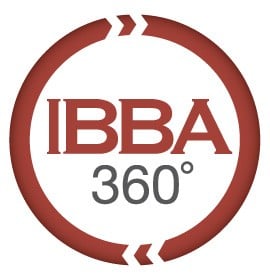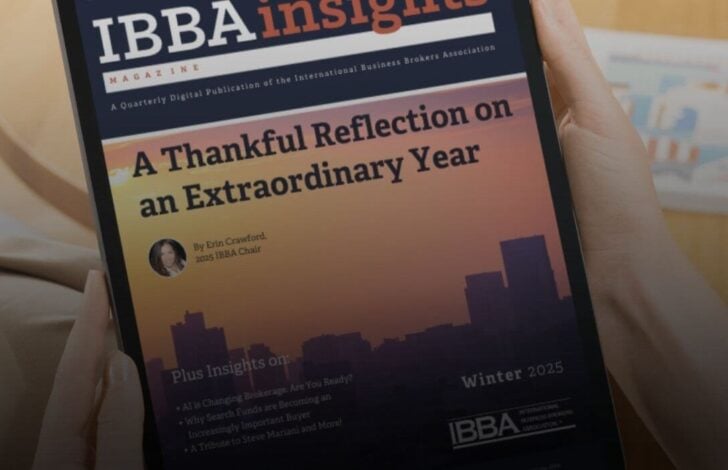IBBAinsights: Winter 2025
IN THIS ISSUE: “A Thankful Reflection on an Extraordinary Year” Letter from the 2025 IBBA Chair. Plus, Insights on AI use in Business Brokerage, Trends in Search Funds as Buyers, A Tribute to Steve Mariani, and more!
We would like to thank everyone who attended the 2013 Spring Conference in Anaheim, CA earlier this month! Please mark your calendars for our Fall Conference, to be held November 18-23 at the beautiful Hyatt Recency Savannah on the historic Riverwalk in Savannah, Georgia.
George Lanza, CBI, M&AMI, CSBA, MEA
Evolving Reality, a New Optimism
 Well it’s time for us to get back to work after a very full and productive week attending the 2013 IBBA Spring Conference. The whole week was a buzz of renewed excitement with our long-standing members, as well as the many new members who all seemed to soak up every possible detail and opportunity to get connected. With that contagious excitement and new and fresh perspectives, we are ready and equipped to seek out new opportunities for our business!
Well it’s time for us to get back to work after a very full and productive week attending the 2013 IBBA Spring Conference. The whole week was a buzz of renewed excitement with our long-standing members, as well as the many new members who all seemed to soak up every possible detail and opportunity to get connected. With that contagious excitement and new and fresh perspectives, we are ready and equipped to seek out new opportunities for our business!
The goal of the conference was for our members to gain a better understanding of the evolving reality within our industry and provide new optimism. I do believe we achieved that goal! Over and over, we heard what a great week everyone was having! Members commented on the quantity and variety of courses and workshops; how they enjoyed the multiple opportunities to network and collaborate with fellow brokers, building their personal network and seeing old friends; the stellar instructors, keynote speakers, and the many talented moderators and panelists who provided relevant and needed information; and the many learning and networking opportunities kept the buzz of excitement going throughout the conference. I would like to thank Doug Robbins, the conference planning committee, and all of you who contributed to making the conference a huge success.
It was my privilege and pleasure to have presented awards to those deserving special recognition for their dedication and commitment to our profession and organization:
Knowledge. Experience. Results. –Submitted by Mark Kulik
The Professional Standard in Mid-Market Transactions – Submitted by John Dini
And what a joy it was to see Clyth MacLeod, IBBA member from Auckland, New Zealand who has been in our industry for 50 years! Join me also in wishing Clyth a very Happy 80th Birthday in October! For me, it was an honor being able to address the members on the “Changing World of the IBBA,” describing the many accomplishments of our association—the growth and improvements we have made in just six months—as well as the update on SITF’s progress with the “MAB” initiative, now a proposed bill HR2274, just introduced into Congress. If HR2274 is passed and incorporates the CBI factors as codified and solidified into law, it will be a “milestone accomplishment” for our IBBA members. You will be receiving communication from the SITF Committee on how you can help.
With the assistance of our management company—Meeting Expectations (ME)—providing support to the board of directors and our members, our association is back on a growth track. But remember, this is “our association” and it depends on our commitment, involvement and participation.
While we all need to return and run our businesses, it was hard to leave the conference, our colleagues and friends. But, that excitement will return when we all meet up at the 2013 IBBA Fall Conference in Savannah, Georgia! If there are specific topics, courses, and workshops you would like to see us develop, let us know—we are here to serve you, our members. Be sure to mark your calendars for November 18-23, 2013 for another great conference, with new courses and workshops, and so much more! We look forward to seeing you in Savannah!
Kevin Dempsey, CBI, CMC, CMEA
CBI No Action Letter to be Codified
 If you were not at the last conference you missed a major announcement affecting each and every one of our members and a huge breakthrough for our industry. Congress finally understands there is a difference between what we do and what Wall Street does in selling businesses. But, don’t break out the champagne yet. We need you and all our colleagues support to get this law passed.
If you were not at the last conference you missed a major announcement affecting each and every one of our members and a huge breakthrough for our industry. Congress finally understands there is a difference between what we do and what Wall Street does in selling businesses. But, don’t break out the champagne yet. We need you and all our colleagues support to get this law passed.
Business brokers and M&A advisors have long appreciated the Country Business, Inc., no-action letter because it clearly stated that as long as businesses were sold in the way Country Business, Inc. does (and as most of us do) it would take no action against Country Business, Inc. However, it only applied to Country Business, Inc., since it was only a no-action letter for them and not the law of the land. Also no-action letters stand to be rescinded at any time by the discretion of the SEC staff. Codification would eliminate that option.
Recently, a bill was introduced (HR2274) titled “Small Business Mergers, Acquisitions, Sales, and Brokerage Simplification Act of 2013”. If passed, it will finally codify the CBI letter. Read the bill and the summary notes.
What you should do now? Contact your Congressperson today. It only takes a few minutes through each Representative’s website to email them. Better yet, seek out a meeting with them. You may only end up talking to their staff, but the word will get to them. If your representative happens to sit on the Financial Services Committee or Banking Committee, then they are even more important.
The main point to get across to your representative is that this is about helping business owners retire while still preserving the jobs of the people working in the business. And more jobs are likely to be created with the sale because buyers of businesses are more likely to have the funds to grow the business. No matter how you say it in your message to your representative, be sure to mention jobs and the economy.
Now is the time to act to get this bill through Congress. Now is the time for YOU to act. Call, write or email your Members of Congress today!
Don’t hesitate to contact me if you have any questions at [email protected].
Steve Wain, CBI, M&AMI
Hey Dad, Can You Lend Me a Cool Grand?
 When my youngest son was in high school, and particularly in college, he used to joke with me and ask that question because he did not fully grasp the concept of risk and reward. I knew he was kidding, but even today, he likes to joke and ask me that even now as a working professional and a number of years out of college. I used to try and have him understand that my “paychecks” were large because of the risk I took in servicing business owners in a very difficult and uncertain transaction. He, in turn (while he was still in high school anyway) liked to compute my hourly wage as compared to his hourly wage while working part-time at a bagel store. You could imagine his reaction when he saw a six-figure closing check on my desk one night.
When my youngest son was in high school, and particularly in college, he used to joke with me and ask that question because he did not fully grasp the concept of risk and reward. I knew he was kidding, but even today, he likes to joke and ask me that even now as a working professional and a number of years out of college. I used to try and have him understand that my “paychecks” were large because of the risk I took in servicing business owners in a very difficult and uncertain transaction. He, in turn (while he was still in high school anyway) liked to compute my hourly wage as compared to his hourly wage while working part-time at a bagel store. You could imagine his reaction when he saw a six-figure closing check on my desk one night.
I explained to him that knowledge, experience, contacts, commitment, and perseverance can greatly influence your ability to not only earn income, but also to gain professional satisfaction. Those traits can be converted in various ways to an hourly wage. Why do we (business intermediaries) actually get that much? Well, whether you are doing a small closing and earning $25,000 or a large one and earn $1,000,000, it is likely because you are good at what you do in a difficult situation.
Most of the business intermediaries that I have the honor to know are well educated, dedicated to continuing education, and bring real value to their clients. Yes, translated, many do make a significant “dollars per hour”, but as I like to tell people, without our services, business owners would probably have made significantly less or nothing in the sale of their business.
We are professionals! We bring together a large array of knowledge in finance, tax, law, and operations. We are the glue that makes small business capital change hands more frequently. And given the uncertainty and risk we absorb when we do make a close, our rewards can be large.
To that end, no one likes to be second guessed by the closing attorney who either has to wire us or write us a trust account check (they usually are wishing they went into our profession). Sometimes we even have issues because of the whole “securities” issue that clouds our profession. For those who have been on the wrong side of an uncontrollable losing argument regarding their fee at a closing, I can only express empathy. When you’ve worked diligently for a year or more and were the primary factor in bringing a deal to closing, you don’t want to worry about being paid.
Last month, after years and years of trying to get some movement to more clearly define an intermediary’s role in the business transfer process, we reached a preliminary milestone. It’s preliminary only because it’s the future positive outcome of this milestone that is key. Nevertheless, the fact that we’ve reached this point is in more ways than one, a very positive outcome. With the support of the IBBA and M&A Source, as well as other organizations that are affected, a bill was introduced into the U.S. Congress (H.R. 2274) that was written for and solely about us – yes, for business intermediaries and brokers. In essence, the bill seeks to provide an exemption for intermediaries and business brokers who provide assistance in the business sale/mergers and acquisition industry.
The bill will allow over 99.9% of IBBA and M&A Source members to provide services legally and in accordance with SEC guidelines. Currently, potential issues exist (speak to your securities counsel) in the receipt of commissions or success fees associated with a security (like a seller note or stock). The legislation, if enacted, will exempt business intermediaries and brokers from current SEC and FINRA licensing requirements as stipulated in the Securities and Exchange Act of 1934. It will attempt to codify the no-action letter that was issued by the SEC in support of the Country Business Inc. (CBI) request in 2007.
If you are unsure of what this means, ask others that you know who are knowledgeable about this. In a nutshell, this is great accomplishment for our industry and for you.
If passed and signed into law, the bill will require the SEC codify and implement this MAB (Mergers and Acquisition Broker) proposal as an exemption to the Securities and Exchange Act of 1934. It will likely require some level of education (not to the level or complexity of a full securities license). The education you receive towards your CBI will be useful towards proof of education in this field and therefore the issuance of a broker or agent license.
Further, this bill will help to distinguish between intermediaries/business brokers and ‘wanna be’s’. It will help separate you and what you do from others that are less educated, less experienced and less successful. It will help us be recognized by more ancillary professionals like attorneys, accountants, and financial planners who could refer business to IBBA and MAS members.
Getting to this point has been long and costly. Our legislative assistance, in the forms of attorneys who work for and lobby on our behalf, has been very substantial. Their work has been only partially paid and all of us not only owe a degree of thanks to them and our SITF Committee (the Strategic Initiative Task Force formed by the IBBA back in 2008) for having this long-term commitment and being persistent to bringing it where it is today, but for their continued work toward a successful conclusion. Our Washington D.C. lead counsel, Shane Hansen, has spent time with many congressional members and has presented our case to a congressional subcommittee in support of the bill during the week of our Anaheim conference.
Your current and future assistance will be requested to help pay for this work. Ultimately, it is you who is the beneficiary of this work. The IBBA has pledged and already paid tens of thousands of dollars in support of this initiative dating back to the formation of the SITF. In the near future you will likely receive a pledge card to help fund the past and future work to be done to complete this task. You can make a payment now, or better yet, pledge a portion of a future closing towards an initiative that will help make that closing even more successful.
Our SITF, lobbyist, and legal counsel continue to produce for us. Your dedication to excellence, perseverance, IBBA membership and education, are what drives your ability to earn an income, and ensure a profitable and more productive tomorrow. It’s the reason your ‘hourly wages’ would make a part-time bagel store employee raise their eyebrows, and give you a way to partake in the high rewards of our field. The IBBA is working for you. Let’s continue to grow our association so that we can further promote what we do, who we are, and why you are the professional any business owner wants to engage.
Make your pledge. Support your future. In fact, on your next closing, consider donating a “cool grand” to your future! Like IBBA membership, it will be pay you back many times over.
It was good to see many of you in Anaheim and I hope you enjoyed the conferences, workshops and education as much as I did. I look forward to seeing you all for an even better conference this November in Savannah, Georgia. Plan your trip now – detail are available on our website.
Cress V. Diglio, CBI, M&AMI
 Wanted: Successful intermediaries to develop new courses for the IBBA!
Wanted: Successful intermediaries to develop new courses for the IBBA!
Following the success of the new educational courses provided at the Spring Conference in Anaheim, the Education Committee is looking for successful intermediaries to share their best practices and state-of-the-art processes to help raise the professionalism of our membership. The IBBA is always developing fresh courses for conferences and online delivery. For each course developed, the Education Committee needs a volunteer Course Development Team of two or three subject matter experts (SMEs) to develop these courses. SMEs are chosen based on their knowledge of the particular subject, their perspective on the brokerage business, and their ability to work together for the best interest of the IBBA. Often, well-received workshops in needed content areas form the basis for new courses.
What is the course development process? I’ve never done this before!
To reduce your time away from the office, the course development team meets through conference calls or web meetings to determine the overall course objectives. In other words, it is the Course Development Team that decides what the participant will be able to do when they finish the course and what they need to know. After the initial meetings, team members generally contribute 8-20 additional hours over a 4-8 month period.
The team works with a professional educational consulting firm to ensure that the course adheres to the principles of adult learning—that what is being taught is useful to the business intermediary—and the course fits into the IBBA curriculum. A lead SME is appointed from the team and has the responsibility of the first and most critical development and review on each deliverable: the course outline, participant guide, PowerPoint’s, exercises, handouts, exam, etc. The rest of the team has the responsibility of contributing material, reviewing each deliverable, and ensuring that the team stays on the agreed upon path. This synergy creates a high quality educational product that meets the diverse needs of our association.
What’s the benefit to me?
Serving as an SME involves time and commitment and gives you an opportunity to shape the next generation of intermediaries. Additionally, it gives you a chance to learn how other experienced intermediaries on the team approach the topic. Working with an instructional designer helps you hone your skills as an educator. And, the team works to create a timetable and work load that fits with your schedule. Most participants in the course development process view it as challenging and rewarding. Recertification credits are also given, so it’s a winwin!
Don’t worry about your skills with computers, writing, education, graphic design or PowerPoint. The IBBA educational consultant makes it easy for you to contribute the content and the IBBA looks after the rest. We look forward to hearing from you! For more information, please contact the Education Manager, Maggie Nicholson at [email protected].
Marcie Woolworth, CBI, FIBBA
 Having had the privilege of attending the IBBA Conference in Anaheim a little over a week ago, it’s nice to come home so invigorated! If you were in attendance, you will agree – if you weren’t in attendance, I sure hope you plan on attending the Conference in Savannah, Georgia from November 18-23! Continue to check the IBBA website for more information.
Having had the privilege of attending the IBBA Conference in Anaheim a little over a week ago, it’s nice to come home so invigorated! If you were in attendance, you will agree – if you weren’t in attendance, I sure hope you plan on attending the Conference in Savannah, Georgia from November 18-23! Continue to check the IBBA website for more information.
At my last writing, we had word that we were up to 50 new members, and found out at the Conference, the number was actually 59! We are so fortunate to have so many renewed members and those who have chosen to be involved with both the IBBA and M&A Source! We welcome you all!
Since we have suffered some loss of membership due to various reasons and with the prior state of our economy, we are thrilled to have these 59 new members get involved. And to those of you, who are not yet involved, please go to the IBBA website. Once you have signed in, on the right-hand side, you will see a link to the Membership Manual. On page 11, the Committees and their descriptions are listed. Please take the time to review these Committees and contact the Chair of the committee that interests you. You will enjoy the camaraderie with other IBBA members and knowing that you have had some impact on how the Association continues on.
The Membership Committee will be sponsoring a New Members Meeting at the IBBA Conference in Savannah in November. Please watch the newsletter for more information as the time draws near.
In addition to Pratt Stats and ShareFile, we have a new benefit I would like to share with you and it is Hoovers/First Research, which will offer you the intelligence you need to close deals: company lists and industry profiles.
Be looking for more education courses coming our way and also for the quarterly survey done in conjunction with Pepperdine University which will be coming to you from the Marketing Committee! Be sure to participate in the survey so you can use the results in your business!
As we continue to search for more valuable benefits, we would appreciate any input that you might like to share! Are there any benefits that you would like to see us add? Services? Please email me at [email protected] or call me at 970-663-9400 – I’d love to hear from you!
Wishing you great success and blessings along the way!
Bob House
 Company Website Optimization: Must Haves to be Found Online
Company Website Optimization: Must Haves to be Found Online
Establishing a strong online presence is more important than ever as the landscape of marketing brands and the business-for-sale marketplace adapts to available technology. Online search is exploding, and setting up the right infrastructure for your brand presence can make the difference between reaping the benefits of increasing searches, or getting buried by higher-ranking services. According to Google, there were 1.7 trillion online searches conducted in 2012, which breaks down to 4.7 billion searches a day! Where does your business appear in these search results?
Expanding on material we presented at the Spring IBBA Conference, we’ve created an exclusive IBBA series to help uncover online trends, what they mean for you, and actionable items to ensure your company’s name will rise up in the search ranks.
We’ll start with the foundation for capturing attention of prospective clients: your company website. This is the hub that will distribute your company message across the internet. Here are some tips to help establish your brand essence and differentiate yourself from other local broker services.
Key elements for your website:
Once you’ve built your site, measure your progress! You can’t improve what can’t be tracked, so create a baseline to measure traffic and visitor flows. Google Analytics is a free and powerful web analytics tool.
Metrics to monitor:
Lastly, and perhaps most important for adapting to growing online search trends, ensure that your website is optimized for mobile devices. At BizBuySell, we’ve seen a 143% increase in mobile visits over the last year, and mobile visitors now account for 30% of our total site visits. How is your business represented on these devices? Platforms like ‘Wordpress’ have provided options for Responsive Designs that will automatically transform websites to fit the device a user is using with an easy-to-read format. We’ve all tried to access mobile unfriendly websites on one device or another, and the back and forth scrolling creates a poor user experience. Don’t let your website fall victim. Make sure mobile users have a good experience with your online brand. In our next segment, we’ll cover Search Engine Optimization (SEO) to further enhance your website by diggin into how search engines prioritize your content.
Bob House is General Manager for BizBuySell.com – the Internet’s largest and most heavily trafficked businessfor-sale marketplace. Currently, approximately 45,000 businesses are listed for sale on BizBuySell and the site receives more than 910,000 monthly visits. BizBuySell also has one of the largest databases of recently sold businesses and a leading franchise directory.
Bart Basi, CPA
 Employer Responsibilities Under The Patient Protection and Affordable Care Act (for 2014)
Employer Responsibilities Under The Patient Protection and Affordable Care Act (for 2014)
As we all know, Congress passed “The Patient Protection and Affordable Care Act” (PPACA) in 2010 as one of the most sweeping pieces of legislation regarding healthcare in this country. While the law was passed three years ago, it is all the discussion right now for people in business. Contained within the PPACA are dozens of provisions including healthcare exchanges, mandates, credits, and rules, rules, rules galore. Of the better known provisions are the healthcare “mandates” for the employer and the taxpayer. Unfortunately, this has sparked more fear and controversy for people in business than it should have. It doesn’t have to be that way. The following will explain the employer’s obligation under the PPACA:
Up to 10 Employees
Within this range, no employer responsibility exists to offer insurance. If compensation is less than $25,000 per employee, then the employer gets a credit if the employer offers insurance and pays at least 50% of the insurance costs. The credit is 25% of the premium paid in 2013 and 35% in 2014. In addition, the cost of premiums are also 100% deductible for the employer.
Up to 25 Employees
No obligation exists for employers with up to 25 employees. If the average worker compensation per employee is less than $50,000 and company pays at least 50% of medical insurance, company can get credits of 35% in 2013 and 50% in 2014.
26-49 Employees
Within this range, there isn’t a penalty for not offering insurance to employees. If an employer has 26 to 49 employees, the employer should take caution to be sure they do not employ more than 49 individuals. Going over the 49 employee level creates large potential penalties. It is important to note that a full time employee is one who works 30 hours or longer in a week. A full time equivalent (FTE) is calculated by taking the cumulative hours worked of all part time employees and then dividing by 120 hours per month. If this product (adding full time and FTEs together) is 50 or over, the employer is a “large employer”. In this category (26-49 employees), if an employer does offer medical insurance to its employees, the employer can deduct the cost of such insurance as a business expense and the employee does not have a taxable income. However, no credit is allowed in this category.
50 Employees and over
Failure to offer affordable coverage (costing less than 9.5% of gross employee compensation) will result in penalties to the employer employing 50 or more full-time employees.
Under the rules, a large employer must offer insurance to all of the full-time employees (full-time employees are those working 30 or more hours per week). If your company does not offer coverage to all full time employees, the penalty is calculated by the number of full-time employees (not FTEs) minus 30, the sum to be multiplied by $2000. In other words, if an employer employs 70 full-time employees as calculated and does not offer insurance, only 40 of those employees would count toward the fine. The penalty for the year would be $80,000. This is a non-deductible cost to the employer.
Strategies
The PPACA will cause an increase in the cost of doing business for many employers. The cold hard reality is that many businesses will not be able to afford being a so called “large employer”. There are ways to deal with the upcoming reality. While we do not endorse any specific idea, businesses have a duty to operate and keep their employees employed. It is up to each individual business to find and implement a strategy that will work for them and their employees under the PPACA.
Conclusion
The healthcare bill has now become law and it is now being implemented. Not only are there incentives for small businesses to cover employees and new opportunities for individuals to obtain health insurance, but opportunities to improve ourselves and our businesses. Many see the PPACA as a negative force on business. However, whatever your opinion is, remember the fact that healthcare is law and, as an employer, you are expected and required to comply with the law.
Walt Lipski, CBI, M&AMI
 At the recent IBBA and M&A Source Conference one of the recurring comments from private equity participants in the various workshops was: “EBITDA is good but we need to understand the cash flow of any business we look at.”
At the recent IBBA and M&A Source Conference one of the recurring comments from private equity participants in the various workshops was: “EBITDA is good but we need to understand the cash flow of any business we look at.”
Many business owners, their advisors and even intermediaries often mistake EBITDA for cash flow. EBITDA is defined as Earnings before Interest, Taxes, Depreciation and Amortization. It is easily calculated by taking normalized operating income and adding back interest, depreciation and amortization expenses. It is better to think of EBITDA as an indication of profitability and only a “proxy” for cash flow. EBITDA is:
Often a business is priced as a multiple of EBITDA, but behind the offer, the terms and conditions of the transaction are being driven by net cash flow. Understanding the difference between the two is critical in educating the business Ownership and their advisors in the positioning and strategy leading up to any sale transaction endeavor.
Generally, what EBITDA is not, cash flow is. Net cash flow reflects:
Net cash flow is the cash that ownership can put in their pocket in the form of dividends or distributions.
Understanding the anatomy of the Net Cash Flow calculation adds clarity to this important financial metric:
Net Income + Depreciation and Amortization + plus changes in Working Capital = Operating Cash Flow
Operating Cash Flow – CapEx = Free Cash Flow
Free Cash Flow +/- Borrowings or Pay-downs = Net Cash Flow
Think of net cash flow this way: it is the earnings of the business that could be removed without affecting the ongoing profitable operations of the business. Put another way, it is the cash left over after salaries, ownership perks etc., and after taking care of all the necessary business expense and commitments.
Why is this distinction so important? Consider a possible buyers perspective, assuming an attractive acquisition opportunity. And now let’s ask the question, “What does every buyer need from a transaction?” Answer: They need enough cash flow to cover:
This is why, from an intelligent buyer’s perspective, net cash flow is so important, because it provides coverage for all of the above buyer needs. EBITDA does not.
Consider this example, a company in the transportation industry is growing at 10%+ per year, with $8 million in EBITDA and is on the market for a 6x multiple or $48 million. On the surface, this sounds like an interesting opportunity based on the above metrics. So our super hero buyer investigates, only to learn that the company is a growing taxi cab business with $6 million in annual CapEx. This means real cash flow is closer to $2 million, not $8 million as originally thought. Would you as a buyer pay $48 million for a business earning approximately $2 million? Would you be in business very long if you did?
Now let’s look from the perspective of ownership considering a sale of their business. What are their options? Basically, they come down to:
Whenever the question of selling a company comes up, ownership will consider the above options and unless there are some unusual outside driving circumstances, (i.e. health, family, financial, etc.) will always have the option to do nothing. Usually this is the comfort option, the least risky from ownerships perspective.
As an intermediary, we have a wonderful opportunity to help both the ownership and their advisors understand the true current economic benefit provided as a result of owning the business. This is a simple two-part equation: first, ownership receives the net cash flow from the business, and second, if the ownership works in the business, then they are entitled to receive compensation in the form of salaries and “perks”. The sum of these two deliverables is the economic benefit provided to ownership. Is there any better starting point for ownership and their advisors to begin shaping and forming expectations with regards to a possible exit transaction?
When we, as intermediaries, help a potential client and their advisor understand the difference between EBITDA and net cash flow, we are starting them on the path to making an informed decision regarding: “Sell Now and Go or Stay and Grow”.
Walt Lipski is a founding partner in Capital Advice, LLC, a Scottsdale, AZ based Investment Banking and Advisory firm for Entrepreneurial owners of lower middle market companies. Securities offered through Burch & Company, Inc. Capital Advice and Burch are not affiliated entities.
Doug Robbins, FCBI, MCBC, M&AMI, CM&A, CSBA, CMEA
Tell Your Client to Keep His Mouth Shut (That’s Why He Hired You)
 We were selling a machine shop about 6 years ago, and the client, Rudy, had already gone through our ‘Phase One Comprehensive Business Analysis’ process and we had valued the business at $1 million.
We were selling a machine shop about 6 years ago, and the client, Rudy, had already gone through our ‘Phase One Comprehensive Business Analysis’ process and we had valued the business at $1 million.
This value included approximately $200,000 in goodwill, plus a lift in the machinery and equipment of approximately $200,000. The cash flow easily supported a selling price of $1 million.
We located a buyer approximately 2 months later, who visited the facility, met with the client, looked at the equipment, and reviewed the financial information in the profile. He indicated that he thought the business was worth between $950,000 and $1 million.
“Great,” I told him. “You should put in an offer.”
“Yes,” he replied, “but I’d like to go through it one more time and take my plant manager with me.”
So, a second tour was arranged that Thursday. The buyer arrived not only with his plant manager, but also with a partner, his accountant, and an equipment appraiser—five of them in all. While the plant was only about 15,000 square feet, the client became separated from our Robbinex salesperson as the entourage toured through the facility. The client wound up having a one-on-one conversation for a few minutes with the buyer.
On Friday morning, we called the buyer in order to solicit his proposal; he wouldn’t return our call. We tried several times on Friday, then again on Saturday and once again on Monday, to no avail.
Late Monday afternoon, I received a call from a lawyer friend of mine. “Hey Doug,” he said, “I see we’re doing a deal together.”
“Oh, really” I said, “which one?”
“My client is buying Rudy’s machine shop,” he replied.
“Oh, great! Have you done the LOI?”
“No, we’ve got the formal agreement of purchase and sale done and signed by both sides. We met with Rudy and his lawyer on Saturday and it’s all done and signed as of an hour ago. All I have to do is negotiate your commission.”
“I don’t know if I understand what’s going on,” I said.
“Well, on Thursday evening, my client asked Rudy what he wanted for the business and Rudy said ‘give me the book value and you pay the broker’ and so they cut a deal for $600,000.”
This was why the buyer’s lawyer had called, to negotiate the broker’s commission. This is a perfect example of why you need to tell your client he should keep his/her mouth shut. Rudy left at least $300,000 on the table—money the purchaser had been prepared to pay before their conversation that Thursday evening—because he spoke out of turn.
In the end we collected our full commission calculated on a sale price of $1,000,000, on the simple basis the buyer had circumvented our confidentiality agreement.
 What is the average private company selling price discount from the asking price – and does that vary by year, industry or company revenues?
What is the average private company selling price discount from the asking price – and does that vary by year, industry or company revenues?
The Pratt’s Stats® database can help answer those questions and more. IBBA members, who are contributing intermediaries, record the “Asking Price” (also known as the listing price) and “MVIC Price” (also known as the selling price) when submitting a deal for inclusion within the Pratt’s Stats database. From this private to private company information, we calculated the “Average Percentage Below Asking Price” (APBAP) in reference to year, industry and net sales. There are currently more than 18,950 total transactions in Pratt’s Stats, of which 5,295 transactions (approximately 28%) contain the information to calculate APBAP.
While looking over the last seven years from 2006 to 2012, the APBAP has been consistent at about 14.3% (as seen below). This shows that even with the highs and lows of the economy, the APBAP remained relatively constant. Also seen below, the average asking price and selling price of the deals specific to Pratt’s Stats have varied over the years with the lows being in 2010 and 2011 and the highs in 2007 and 2009.

Source: Pratt’s Stats®, available at www.BVMarketData.com. Created on 12/13/2012
We also looked at the APBAP per industry from 2006 to 2012. As seen below the APBAP shows very slight industry variance with Agricultural and Retail Trade industries showing a higher APBAP and Real Estate and Insurance Agencies showing a lower APBAP.

Source: Pratt’s Stats®, available at www.BVMarketData.com. Created on 12/13/2012
Now that we have addressed APBAP over the years and in relation to each industry, let’s now look at company size. Exhibit 3 compares the APBAP in quintiles of net sales for the combined seven years. From this data it appears that a larger company is more likely to sell at a price closer to the asking price than a smaller company.
Source: Pratt’s Stats®, available at www.BVMarketData.com. Created on 12/13/2012
This overview of APBAP was made possible by intermediaries, like you, who submit their transactions to Pratt’s Stats. Contributing members of the IBBA receive free access to Pratt’s Stats when their transactions are included in the Pratt’s Stats database – three months of complimentary access for every deal that’s included in Pratt’s Stats. IBBA members may submit their closed deals to Pratt’s Stats electronically by registering at BVMarketData and submitting their transactions online. IBBA members may also submit transactions by printing a contributor registration form and a Pratt’s Stats submittal form at BVMarketData, completing the forms and faxing them to Business Valuation Resources. If you have any questions, contact Business Valuation Resources at 503-291-7963.
Clyth MacLeod, Lifetime CBI
 Own Your Business, the Best Investment
Own Your Business, the Best Investment
I enjoyed a coffee last week with a couple who have owned and operated a small suburban fast food outlet for the last eight years. They are now ready to move on and already have their next venture underway.
The fast food shop has been good to them. They have purchased three investment properties out of profits and are funding the new project without any borrowings.
They have been good for the business–growing it through pleasant personal service, excellent food, cleanliness, and hard work. That being said, they are only open 6 days per week and 48 hours per week.
Now they are ready to sell. Because they have grown the sales and profits they will make a substantial tax-free capital gain.
Their story reinforces the fact that owning your own business gives you control over your destiny, independence, challenge, and the opportunity to earn a really high income.
Immigrants…Welcome!
Auckland’s leading residential real estate firm, Barfoot and Thompson, recently published a list of their top 25 salespeople for the year. Of the 25, 19 of them had Asian surnames.
We believe this demonstrates the industriousness, commitment, and professionalism that many immigrants bring to a new career in a new country. Without the “old boy” networks from school and sport that those born here enjoy, these new New Zealanders compensate with enthusiasm, persistence, and hard work.
Our own business sales company has Korean, Chinese, Indian, and South African born comprising 50% of our team. They confirm my belief that immigrants enrich our country culturally and financially. We have some tasty luncheons, too.
Keith McLeod, CBI
 During our recent IBBA and M&A Source Conference I took a course from friend Walt Lipski. I asked him to draft an article for the newsletter and I’m grateful he did. He writes of a significant difference between cash flow and EBITDA. It is important for brokers and intermediaries to be aware of the difference for their clients, the client’s advisors and themselves. It should be required reading for your staff, and would be an interesting article for your accountant or CPA.
During our recent IBBA and M&A Source Conference I took a course from friend Walt Lipski. I asked him to draft an article for the newsletter and I’m grateful he did. He writes of a significant difference between cash flow and EBITDA. It is important for brokers and intermediaries to be aware of the difference for their clients, the client’s advisors and themselves. It should be required reading for your staff, and would be an interesting article for your accountant or CPA.
During our recent IBBA and M&A Source Conference I took a course from friend Walt Lipski. I asked him to draft an article for the newsletter and I’m grateful he did. He writes of a significant difference between cash flow and EBITDA. It is important for brokers and intermediaries to be aware of the difference for their clients, the client’s advisors and themselves. It should be required reading for your staff, and would be an interesting article for your accountant or CPA.
It is impossible to be in this industry for a period of time without running into a stock transaction. Handling such a transaction, especially one of a significant size, may result in a loss of your commission without a securities license. Members of the IBBA and M&A Source are working diligently to avoid this risk by crafting legislation to allow brokers and intermediaries to handle these types of transactions, up to a predetermined level within SEC guidelines. Please read the articles of George Lanza, Kevin Dempsey and Steve Wain for further clarification.
The key for our industry is for Congress to pass House Bill HR2274. It is in the House Committee on Financial Services, also known as the House Banking Committee, and must be voted out of Committee to the floor of Congress where all Representatives will vote on it. Therefore, we need to encourage House Banking Committee members to vote yes on it before going to the full House. These members are:
Members of the 113th Congress to be contacted
IBBA and M&A Source members should check the state they are living and working in, and identify the Congress Person. If you vote in this Representative’s District please call, visit and write identifying House Bill HR2274 and ask for their support. If you are not living in their District contacting them will be a waste of time. They focus only on their own constituents. Once it is voted out of Committee then all Representatives will vote on the Bill and your support and contact of your local Representative will be crucial at that time.
New Republicans for the 113th:
New Democrats as of the 113th:
This is an action packed newsletter for members. Bob House, General Manager of BizBuySell, offers valuable suggestions for enhancing your web site. Bart Basi, popular speaker for our conference workshop sessions alerts us to 2014’s Congressional legislation impact affecting our client’s and prospect’s responsibilities for their employee’s health coverage. We should all have this knowledge, and provide a copy of Bart’s article for our staff. Marcie provides an upbeat message of increasing IBBA membership. And Doug Robbins’ gem of an article highlights the value of listening and combating attorneys to cut our commissions. Finally, veteran industry leader Clyth MacLeod offers tips to close more deals.
The economy is heating up and it is a great time to be a broker or intermediary.
Sept. 9-12 IBBA Fall Educational Summit (Dallas, TX)
Sept. 11-12 TABB Conference (Dallas, TX)
Nov. 15-16 NEBBA Conference (North Andover, MA)
Nov. 18-23 IBBA Fall Conference (Savannah, GA)
George O’Neill
Don Emmett
Mina Singson
Michael Schwantes
Francois Dionisi
Kevin Vandenboss
Thank You to our IBBA 360 Sponsor, Diamond Financial!


IN THIS ISSUE: “A Thankful Reflection on an Extraordinary Year” Letter from the 2025 IBBA Chair. Plus, Insights on AI use in Business Brokerage, Trends in Search Funds as Buyers, A Tribute to Steve Mariani, and more!
Dear IBBA Members, As I close out my term as Chair of the Board of Governors, I find myself reflecting with immense pride and gratitude on all that we have accomplished together over the past year. It has truly been a landmark year for the IBBA—and it’s thanks to the dedication, passion, and professionalism of […]
The business brokerage world is shifting faster than most people realize. Technology has already changed how buyers search, how sellers prepare, and how deals move from start to finish. But nothing is reshaping our industry more than artificial intelligence. It is not a small upgrade. It is a complete shift in how the best brokers […]
Newsletter Sign UpGet the latest insights on buying and selling small businesses direct to your inbox.


